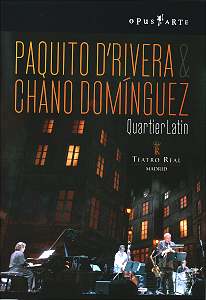1. Por Alegrias
2. I Remember Dizzy
3. Rumba pa’Jerry
4. Poinciana
5. Aria de Musetta
6. Blues Imaginario
7. A mi Padre
8. Vamonos pa Cai
9. Bruselas en la Fluvia
10. Rumba Marina
Chano Dominguez – Piano
Paquito d’Rivera – Alto sax, clarinet
Anga Diaz – Percussion
Marc Miralta – Drums
Mario Rossy – Bass
Israel Suarez "Pirana" – Flamenco
percussion
Paquito
d’Rivera is one of those musicians - like
Chucho Valdes and Arturo Sandoval – who came
out of Cuba to amaze us with their technical
prowess. First with Irakere and then with
Dizzy Gillespie’s United Nations Orchestra
(which Paquito has led since Dizzy’s death),
Paquito established himself as a force to
be reckoned with. On this DVD we can see the
man in action, and he is certainly very talented.
The concert was filmed at the Teatro Real
in Madrid, where a production of Puccini’s
La Bohéme was still running,
so the musicians play against the backdrop
of a square in the Latin Quarter of Paris.
Because it’s a night-time scene, the atmosphere
is a bit gloomy, leaving the musicians in
rather dark surroundings.
Nevertheless
the music shines through, with Paquito and
Spanish pianist Chano Dominguez on top form,
backed by a faultless bassist and three percussionists
who constantly add to the dynamism of the
performance. The concert opens with a thoughtful
piano introduction from Dominguez, with hints
of flamenco in the rhythms. Chano is credited
with creating the "New Flamenco Sound"
and the music sometimes reminds me of Lionel
Hampton’s Jazz Flamenco album and Chick
Corea’s Spanish-tinged explorations. This
opening track, Por Alegrias, is a sequence
of fairly gentle 12-in-a-bar meditations.
After this, Paquito d’Rivera enters and plays
his own composition, I Remember Dizzy,
on clarinet, appropriately quoting from A
Night in Tunisia. The tune is a bossa
nova but it’s notable that none of the percussionists
plays what is usually considered to be the
usual bossa beat (which has admittedly become
somewhat hackneyed). Paquito introduces each
number but these introductions are in Spanish,
without subtitles. Yet you don’t feel you
are missing much, as the music is a universal
language that everyone can understand.
Chano’s
composition Rumba pa’Jerry (dedicated
to Jerry Gonzalez) heats things up after the
comparative serenity of the first two tunes.
Paquito’s alto sax blazes, and Chano’s piano
solo is equally fiery. The three percussionists
are featured together, with Israel Suarez
playing what looks like an ordinary wooden
box and Anga Diaz hitting the conga drums
with great power. The man appears to have
hands of steel. Sadly, he died a few months
after this concert, at the early age of 46.
Poinciana
pays homage to Ahmad Jamal with the sincerest
form of flattery. The group builds a very
similar pulse to the one on Jamal’s classic
recording. Because the group is backed by
scenery for La Boheme, the quintet
plays Paquito’s arrangement of an aria from
that opera. It is in 6/8 time, and Paquito’s
clarinet soars heavenwards like an operatic
soprano. Chano’s Blues Imaginario speeds
up the tempo again: a very lively blues with
a hustling Latin beat. After an electrifying
piano solo, Paquito signals the percussion
to fall silent and he plays a duet with Chano
that is full of friendly humour – one of the
highspots of the evening (but just one of
many). Chano’s A mi Padre moderates
the tempo, with poignant solos form the two
frontmen.
Vamonos
pa’Cai provides another contrast, described
in the sleeve-note as "a furious buleria
by Chano". A buleria is apparently another
flamenco genre in 12/8. Marc Miralta’s drums
propel this along through several changes
in tempo, alternating between Latin-American
Spanish and straight 4/4 swing. Paquito introduces
the musicians with good humour before two
encores: a bolero written by Paquito to honour
Toots Thielemans (ending with some more playfulness
between Paquito and Chano) and Chano’s Rumba
Marina with a short but impressive drum
solo. Throughout the concert, the three percussionists
maintain those intriguing overlapping rhythms
which are one of Latin America’s greatest
contributions to modern music. This, along
with the inspired solos, makes for a completely
invigorating performance.
Tony Augarde
